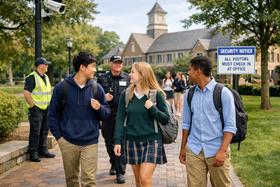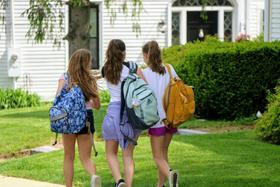Read more details about The Webb Schools on their 2026 profile page.
Reflections and Advice:
1.) What do you think makes your school unique relative to other boarding schools?
I think the most unique and definitive aspect of Webb is the high quality of faculty and staff. By that I do not mean advanced degrees (of which Webb teachers have plenty), but rather their ability to help students grow as individuals, leaders, and scholars. I cannot stress just how important this is! Webb faculty members live on campus, are available 24/7, and are often on duty in the dorms or leading some kind of activity. The vast majority of Webb teachers are committed to this sort of lifestyle (which I think is tough to ask of any adult) and they genuinely enjoy being around teenagers. They become your mentors, your cheerleaders, and your ride to the airport, and they really get to know the students beyond the polite introduction. I remember one time I was stranded with no ride because I went off-campus on my own. I then called my advisor, who came to pick me up at 10pm on a Friday night. Students often become very close to at least a few faculty members, which is the norm at Webb. My closeness to Webb faculty members has allowed me to be honest with myself and the community, which is extremely valuable as it's enabled to me to get good feedback and become a better version of myself.
2.) What was the best thing that happened to you in boarding school?
I'm surprised that there has not been a question about college admission. It is an important factor in selecting a high school, so I'll talk about that.Webb's College Guidance Office is really really helpful. Our Director of College Guidance is well-known in his field and is interviewed regularly by the LA Times. Webb students are really well prepared in the college search process, which starts in junior year. Webb holds your hand throughout the process, so you pretty much never have to worry about not getting into a decent college. There are no surprises, except when people get into much better schools. This is especially true if you are a B+/A- sort of student at Webb. If you are an A+ student aiming for a top college, your chances of getting into somewhere your one dream school (let's say it's Harvard) is probably no different from a similar student applying from a public school. The process is so arbitrary at the top level that you can never guarantee admissions at any school. That's why Webb will tell you to spread your net wide, and it is very very likely that you'll get into a Ivy+ school in the end, if not your dream school. However, if you are a B+ student at Webb, you will fare much much better at Webb than in a public high school. That's because colleges are aware of Webb's rigorous coursework. Webb's college guidance is especially helpful for those who are not too pre-occupied or competitive with college admissions.Also, another great thing is that you do not have to deal with any paperwork. Webb CG office coordinates all your recommendations and transcripts for you. You just need to figure out which colleges you are applying to (a list of 10), decide on your recommenders, inform the CG office, and they'll do the rest for you. The only condition is that your list of 10 schools needs to be approved by the CG office (not even your parents have veto power). Nothing gets sent out outside the CG office. I'm talking about a level of central planning that is comparable only to Communist China. So if you're thinking about applying to the top 30 schools ranked by the US News and Report, you will be strongly discouraged from doing so, for good reasons anyway. This system ensures that high school seniors do not do stupid things and jeopardize their chances. This is also why everyone at Webb gets into the best schools that they can possibly get into given their record. It is very clear to me that we are getting help from true experts, which has made the college admissions process so much more bearable.I also want to point out that Webb teachers write AMAZING recommendations. This is a combination of them being really nice, generous people as well as me having lots of opportunities to interact with them. It is not typical for students in other schools to get recommendations from teachers that have taught them for three years or have traveled to France with them.
3.) What might you have done differently during your boarding school experience?
I don't think I would have done anything different. I've learned valuable lessons from every mistake I made a Webb. I changed a lot throughout my time at Webb and everyone was very accepting.
4.) What did you like most about your school?
As I've mentioned before, the people and the tight-knit community.
5.) Do you have any final words of wisdom for visiting or incoming students to your school?
Visit a class. Talk to faculty members. I think Webb looks for outgoing, independent individuals, so take charge of your education and take initiative.
Academics:
1.) Describe the academics at your school - what did you like most about it?
The small class size definitely makes a big difference as it gives each student lots of opportunities to speak up and develop independent minds. Being close to faculty members outside of class is also a big plus, as I have mentioned before, because it encourages co-curricular learning. Class discussions are also engaging and enlightening (much more so in comparison to college class discussions.) In general, Webb classes are challenging, but most teachers are generous graders and reward students for effort. I do not think that anyone should be worried about the difficulty of coursework at Webb given that you work hard enough. On the other hand, be prepared to work VERY hard and all the time if you want straight As in tough courses. I actually spent more time studying at Webb than I ever did in College just because there was so much "busywork" (in the best sense of this word.) Also, when I was at Webb, competition was very much limited to the top 10 students in each class. I'm not sure what it's like now, but for all I remember, (and I was very competitive), competition was not prevalent and was very much self-selective.Webb also offers many AP courses, which was important to me because it is great preparation for college. (I took 10 AP courses throughout my Webb career.) There are more choices after freshmen year, though not as much as I wanted at that time. (I mean, I wished that I could take AP Government instead of another AP history course.) In hindsight, I'm glad I was more or less forced to take certain classes because it made me deal with subjects that I didn't like as much. It also provided structure to my education - a broad and comprehensive liberal arts curriculum.Webb is academically more like a liberal arts college than a big research university - if this helps you get an idea of what the school is like. The downside is that Webb doesn't have the traditional competitive model UN, mathletes sort of programs that many public high schools offer. If you're already involved in this type of activity and enjoy competing in nation-wide contests, it might be a disappointment to you. But again, looking back, I don't think it matters because Webb also offers other types of academic experiences that look just as good for College.
Athletics:
1.) Describe the athletics at your school - what did you like most about it?
So Webb students are required to be in a sports team every year for one season (out of three), which is very much structured into the after school program (which runs from 3 to 5), so you can only be in one team each season. I must confess that I've always hated sports and found ways to get exempted from the requirement my junior and senior years.Again, I'm not a big sports person, so please do not rely on my account. All I can say as someone that is athletically-challenged is that Webb offers lots of different sports. Webb has never been an athletics powerhouse, but there are some amazing athletes here and there. The great thing about Webb's sports program is that because everyone's requiredto take part in it, coaches and your fellow teammates are willing to help you improve. For example, a friend of mine at Webb who used to swim for her country's national team always took the time to train me and help me with my butterfly. My 100 yard Free went from something like 1 min 50 seconds to 1 min 15 seconds in one season with all the support I got. It is not unusual for someone to start as a novice and finish as a Varsity MVP.
Art, Music, and Theatre:
1.) Describe the arts program at your school - what did you like most about it?
I've only been involved in the choral program, which is actually a class and not a extracurricular activity and is open to everyone. The arts program in general is satisfactory but not outstanding. Like all things Webb, the best part is that anyone can join and learn. The downside is that it's not a particularly competitive or strong or extensive program. However, I'm biased because I'm from Hong Kong and the school I previous attended has one of the best music programs in the world, complete with a 80+ student strong full orchestra and multiple award-winning choirs.The theater program is also an after school activity. I'm actually quite a fan because they tend to pick these very sophisticated whimsical plays or musicals that are almost more appropriate for an older audience. I mean, one year they did Sondheim's Company, which in my opinion is an inspired choice.I don't know much about the visual arts program, but I hear that a number of recent graduates have went on to top design schools like RISD and Parsons, which is very impressive.
Extracurricular Opportunities:
1.) Describe the extracurriculars offered at your school - what did you like most about it?
I was heavily involved in student government at Webb, which I believe must be one of the best leadership programs a school can offer. Student government is fantastic at Webb because there is so much buy-in from students. The participation rate is always over 90%, which if nothing else gives you a great sense of self-importance and satisfaction. Webb also has great student government advising, which is key to the program. Our advisor would always guide us, help us debrief, and give us insightful individual feedback. I went from being a nerdy, self-conscious freshmen to a well-respected and well-liked student leader my senior year thanks to the confidence and support my advisors gave me.Other than student government, the two other most time-consuming and substantive leadership activities are Dorm Council and Honor Cabinet. Around 30% of the senior class have positions in one of these three organizations. Other than that, people tend to be involved in sports or the arts or with the museum.The yearbook is also great and used to be the only publication at my time. It is also a after school activity. (If you're interested, you should check with Webb to see what their current afternoon activities are. They changed quite a bit even throughout my time at Webb.) Clubs are generally weaker because after sports, classes, and leadership positions, students are already too busy to invest too much time in clubs. There is also already a saturation of weekend activities for clubs to play a prominent role in programming. There are occasionally some successful clubs but they are very much driven by individual students, who are allowed to start and manage their own clubs.
Dorm Life:
1.) Describe the dorm life in your school - what did you like most about it?
The greatest part about the residential life is that it helps you become friends with people who are very different from you. The room assignment process is random the first year and students can only choose their own roommates their second year. There is a points system which allows students with higher points to choose first. However, this is rarely a problem - there really isn't a room or dorm that is more desirable than others. Most students have roommates until their senior year, but I enjoyed having a roommate so much I had one all four years! Also, there are rooms reserved from all four years in each dormitory, so there is always an even balance. I love residential life at Webb because it creates a very tight-knit, cohesive community.
Dining:
1.) Describe the dining arrangements at your school.
Webb's dining hall is open during breakfast, lunch, and dinner hours to everyone - students, faculty and staff, their families, and pretty much anyone that waltzes into the dining hall. Food is served buffet style, so you can eat as much as you want. There's also formal dinner once or twice a week, which is when everyone in the community is randomly assigned to a table hosted by a faculty member. It is more formal in that students sometimes have to take on roles as waiters and are responsible for bringing food to the table and cleaning up afterwards. Formal dinners were considered a nuisance by most but are now fondly remembered as an excuse to spend time with wonderful people and if not an opportunity for character building.The food itself is actually not bad. The problem is that it gets really repetitive after a while. Even the best cuisine becomes boring, so you can only imagine how it feels to deal with mediocrity day after day. Fortunately, there is a salad bar, a sandwich bar, a microwave, a bagel station, and two toasters in addition to the cooked entrees. You will be amazed by our ability to innovate with these resources: I've seen really impressive sandwiches in terms of absurdity of size as well as resemblance to panini. Also, there are lots of healthier and vegetarian options. Many students have decided to become vegetarians or even vegans throughout their time at Webb, including boarders. On the other hand, the dining hall does not provide kosher or halal options, but I do not believe that this has been requested in the past.Also, it is always possible to order out or go out for dinner. By the time I was a senior, I ate out A LOT and barely went to the dining hall for dinner anymore. I either ordered out (which is always expensive), went out with teachers or day students, or microwaved whatever I had (greatest preparation for college). So if you're not a fan of the dining hall, it's not a big deal.
Social and Town Life:
1.) Describe the school's town and surrounding area.
Claremont is perfect - I only wish that our campus is closer to the Claremont Village. Claremont is home to the Claremont Colleges, and its "downtown" is commonly known as "the Village". Claremont Village is a small, academic, well-off, hipster college town with lots of old people or college students and fantastic restaurants and icecream/froyo places. Claremont is the ideal place to go to school because it's safe and friendly. It's got really interesting and quirky bits but never too distracting.Also, it's great being in southern California. The weather is beautiful all year long. I used to wear shorts in the winter. This actually really makes a huge difference as I was miserable when I first moved east for college. It encourages everyone to relax and spend time outdoors. Claremont is around half an hour away from Pasadena and an hour away from L.A. - there are a lot of shopping areas, theme parks and beaches, which Webb students take advantage of during the weekend.
2.) Describe the social life at your school - what did you like most about it?
Social life is great. The student body is small and very cohesive. Like all high schools, there are cliques, but they are more fluid than the sort of clique portrayed in the movies. Because students spend so much time together in a contained space, everyone gets to know everyone else really well. The school creates an environment that allows different people to mix with each other. For example, I felt comfortable joining pretty much any table during lunch or dinner. Webb is like a big melting pot of different personalities and backgrounds. I was close friends with people who are dramatically different from me in every measure possible. This was very valuable to me as it gave me prospective.
Daily Schedule:
Weekday
8:15 AM
Breakfast Check-in
8:30 AM
Class (the block schedule changed recently, so I don't actually know how exactly classes are structured anymore.)
10:15 AM
Assembly or Chapel Talk (for 45 mins only in between class)
12:30 AM
Lunch
1:30 PM
Class
3:30 PM
Afterschool Activity: a sport, yearbook, theatre...etc
5:15 PM
Dinner/Free time or Formal Dinner
7:30 PM
Study Hours (internet gets shut off for the first hour)
10:00 PM
Study Hours Ends/ Room Check / Free time (usually when people shower and get ready to go to bed
10:30 PM
Lights out for underclassmen, upperclassmen can stay up as late as they want. Dorms are now locked.
Weekend
11:00 AM
Wake up anytime / no breakfast Check-in
11:30 AM
Lunch is served until 1pm
1:30 PM
Go on some kind of trip on Webb Van, usually to the Village or to shopping mall or complex
4:30 PM
Return to Webb, Sign in in Hooper, Hang out with on-duty faculty members
5:30 PM
Dinner
6:30 PM
Hang out with friends or return to my room to do some kind of work
7:30 PM
See my friends perform in a musical. Sometimes I will photograph the performance for yearbook.
9:00 PM
Intermission. I steal cookies at the reception. Chat with parents.
10:30 PM
Musical Ends. I go back to my room. Lots of socializing in between.
11:00 PM
Return to dorm. No lights out, but everyone's required to be inside after 11pm.
Read more details about The Webb Schools on their 2026 profile page.
Alumni Reviews Review School
Review
Description
The classroom setting of a round table discussion instead of lecture based teaching. I believe it really puts the pressure on the student to understand what is going on in the class and bring an. . .
Webb has a clear focus on community and it really shows. When you are a student you become best friends with the faculty and your fellow students, traversing the boundaries of what most schools can. . .
The Webb Schools is unique in many ways different than other boarding schools. One being that it is a boy's school and a girl's school on one shared campus. This allows the freshman and sophomore. . .
Show more reviews (26 reviews)
Recent Articles

Financing a Boarding School Education in 2025 Review
Explore updated 2025 boarding school costs, financial aid trends, payment strategies, and policy insights for families planning independent school education.

Free Boarding Schools 2025: Updated Tuition-Free Boarding Options
Explore current tuition-free and income-based boarding schools in 2025, eligibility, trends, and expert insights for families and policymakers.

Boarding School Safety in 2025: Health, Cyber & Campus Life
Explore how boarding school safety has evolved in 2025, including health protocols, cyber protections, and residential life standards.





